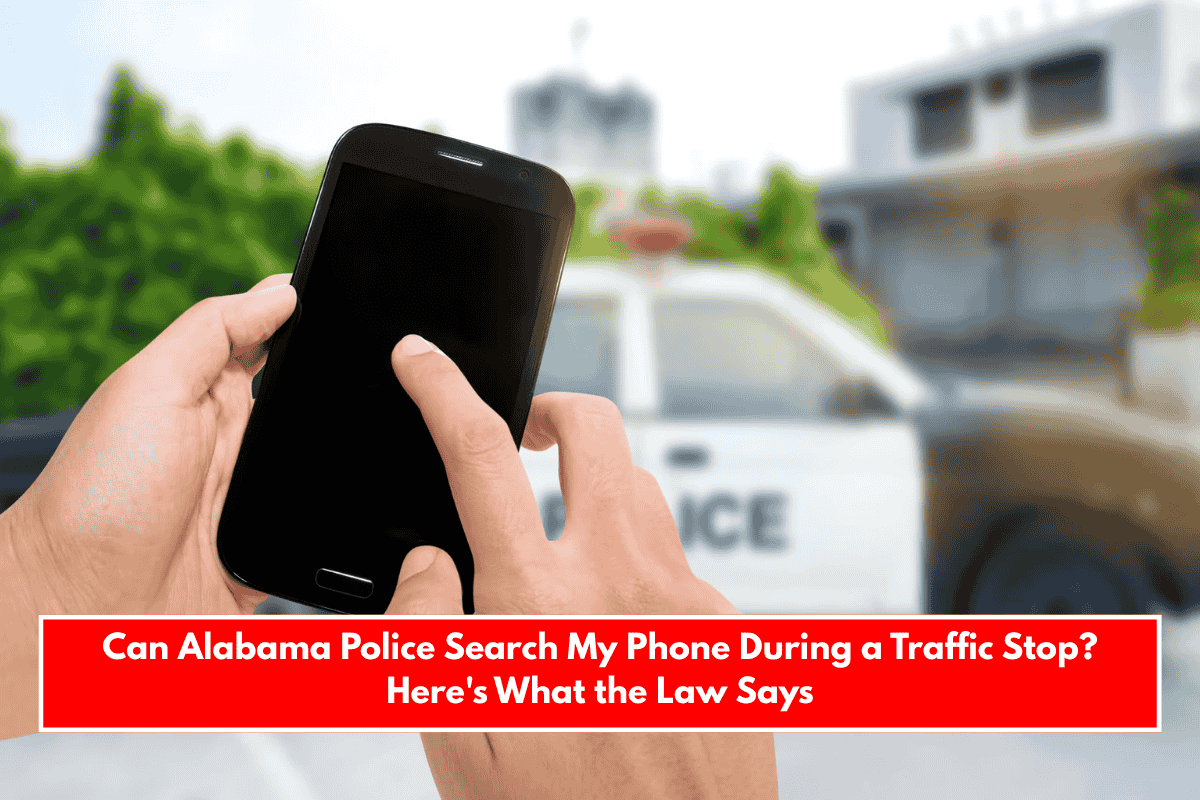The question of whether police in Alabama can search your phone during a traffic stop is governed by both federal constitutional law and specific state statutes. Recent legal developments and Supreme Court rulings have set clear boundaries for law enforcement. Here’s what you need to know:
Your Phone Is Protected by the Fourth Amendment
- The Fourth Amendment of the U.S. Constitution protects individuals from “unreasonable searches and seizures,” including the contents of your cellphone.
- The U.S. Supreme Court, in Riley v. California (2014), ruled that police generally must obtain a warrant before searching the digital contents of a cellphone, even if you are under arrest.
- This protection applies in Alabama as it does in every other state.
What Happens During a Routine Traffic Stop in Alabama?
- If you are pulled over for a traffic violation, police may ask for your license, registration, and proof of insurance.
- Alabama law allows you to present your vehicle registration and proof of insurance on your cellphone. However, the law specifically prohibits officers from searching through your phone for anything other than the registration or insurance information you present.
- Officers cannot look through your texts, emails, photos, or other apps simply because you handed over your phone to show your registration.
When Can Police Search Your Phone Without a Warrant?
There are only a few exceptions to the warrant requirement:
- Consent: If you voluntarily give police permission to search your phone, they do not need a warrant. You are not required to consent, and you can refuse politely.
- Search Incident to Arrest: While police can search you and your immediate belongings after a lawful arrest, the Supreme Court has ruled that this does not automatically allow them to search your phone’s contents without a warrant.
- Exigent Circumstances: If there is an emergency—such as preventing the destruction of evidence or responding to a life-threatening situation—police may be able to search your phone without a warrant, but this is rare and must be justified.
- Plain View: If illegal content is visible on your phone screen without searching (for example, if you unlock your phone and an incriminating photo is displayed), officers may be able to act on that information.
What About Searching Your Car During a Traffic Stop?
- Police can search your vehicle without a warrant if they have probable cause to believe it contains evidence of a crime, or if you give consent.
- However, this authority does not extend to your cellphone unless one of the exceptions above applies.
What Should You Do If Asked to Hand Over or Unlock Your Phone?
- You have the right to refuse a search of your phone unless the officer presents a valid warrant or a qualifying emergency exists.
- You are not required to provide your passcode or unlock your phone for police unless ordered by a court.
- If you are pressured or coerced into consenting, you should inform your attorney, as coerced consent may be challenged in court.
Alabama Police and Cellphone Searches
| Situation | Can Police Search Your Phone? |
|---|---|
| Routine traffic stop | No, not without consent or warrant |
| You show registration/insurance on phone | Only those documents, nothing more |
| You give consent | Yes |
| After arrest (no warrant) | No, warrant still required |
| Exigent circumstances/emergency | Possibly, but must be justified |
| Probable cause but no warrant | No, unless an exception applies |
Key Takeaways
- In Alabama, police cannot search your phone during a traffic stop unless you give consent, they have a warrant, or a rare emergency justifies the search.
- Simply handing your phone to show registration or insurance does not give officers the right to search its contents.
- Always be polite but firm: you have the right to refuse a search of your phone.
- If your rights are violated, evidence obtained from an improper search may be suppressed in court.
If you believe your phone was searched unlawfully, consult an experienced criminal defense attorney to protect your rights.
Sources:
- https://www.joelsogol.com/articles/us-supreme-court-rules-on-warrantless-cellphone-searches/
- https://abc3340.com/news/local/new-law-changes-the-way-traffic-stops-go-down-in-alabama
- https://www.stonebritt.com/improper-searches
- https://www.criminal-defense-attorney.info/blog/can-police-search-my-phone-records-after-dui/
- https://www.fletc.gov/sites/default/files/imported_files/training/programs/legal-division/downloads-articles-and-faqs/research-by-subject/4th-amendment/searchingavehicle-consent.pdf














